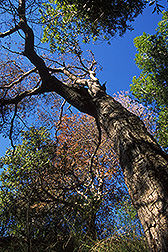This page has been archived and is being provided for reference purposes only. The page is no longer being updated, and therefore, links on the page may be invalid.
|
Read the magazine story to find out more. |
|
|
|
|
Tree Heartwood Extracts Thwart Sudden Oak Death Microbe
By Laura McGinnis
April 8, 2008
Help may be on the way for more than 100 plant species susceptible to sudden oak death (SOD). Agricultural Research Service (ARS) plant physiologist Daniel Manter has found that extracts from tree heartwood can limit the growth of Phytophthora ramorum, the microbial agent that causes this devastating disease.
Since it surfaced on the West Coast in the mid-1990s, SOD has killed an estimated 1 million oaks and tanoaks. For years, scientists have known that tree heartwood contains protective antimicrobial compounds, but it wasn't known whether these compounds could offer protection against P. ramorum.
Manter, with the ARS Soil Plant Nutrient Research Unit, Fort Collins, Colo., and his colleagues exposed P. ramorum spores to compounds, wood chips and essential oils extracted from heartwood. They found that extracts from incense cedar, western redcedar, Alaskan yellow cedar, western juniper and Port Orford cedar destroyed P. ramorum spores and inhibited fungal cell growth.
The western redcedar and incense cedar extracts damaged twice as many spores as the extracts taken from Alaskan yellow cedar, western juniper and Port Orford cedar. Douglas fir and redwood extracts, which were also examined in the study, showed little to no antimicrobial activity against the pathogen.
Tree heartwood extracts could provide easy-to-use, environmentally friendly, effective tools for SOD control. Heartwood could be processed into shavings, sawdust, wood chips or liquid extracts. These materials could then be distributed in areas with high human activities—such as park trails, walkways, and bike paths—to reduce spore movement and prevent the spread of the disease.
Read more about this research in the April 2008 issue of Agricultural Research magazine.
ARS is the chief scientific research agency of the U.S. Department of Agriculture (USDA). This research was conducted with scientists from USDA's Forest Service, and Oregon State University.

